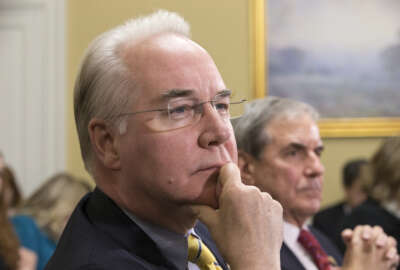
AFGE: Time to play catch-up with 5.3 percent pay raise
The American Federation of Government Employees, along with some members of Congress, said a 5.3 percent pay raise for civilian and military personnel isn't out of...
A 5.3 percent raise.
That’s number the American Federation for Government Employees is energetically pushing for civilian and military personnel in fiscal 2017 — well over the the 1.6 percent pay raise President Barack Obama will request in his budget proposal.
AFGE acknowledged it’s setting the bar high this year after six consecutive years of pay freezes or small bumps in pay.
“We may or may not get a 5.3 [percent raise],” AFGE National President J. David Cox told reporters at the union’s Feb. 8 legislative and grassroots mobilization conference in Washington. “But we are clearly putting on the record that we are owed the 5.3.”
Though some have already written off a 5.3 percent raise as unlikely, AFGE, as well as some members of Congress, say it’s time to play catch-up on the years when pay remained relatively stagnant.
“For so many years, [federal employees] essentially were the ones who sacrificed for the sequestration effort,” Rep. Chris Van Hollen (D-Md.) said in an interview with Federal News Radio. “Now, that the economy has come back, they need some catch-up as well. In other words, they need to at least build back, if not to where they would have been, to at least have something of a more decent wage.”
Van Hollen is the ranking member of the House Budget Committee Ranking Member and was critical of the President’s 1.6 percent proposal.
A proposal for a 3.8 percent federal pay raise didn’t go far when Rep. Gerry Connolly (D-Va.) introduced the Federal Adjustment of Income Rates Act (FAIR Act) in January 2015. The bill had about two dozen sponsors, including Del. Eleanor Holmes Norton (D-D.C.) and Reps. Elijah Cummings (D-Md.) and Van Hollen.
But that proposal could gain some new life.
“I promise you, I will do everything in my power to make sure you are fairly compensated for your work and you get meaningful pay raises,” Cummings said at AFGE’s legislative conference.
Though only a 3.8 percent raise, Cox said it’s a better offer than what the President is set to request.
“Obviously, if the Congress would vote for 3.8, I’d still ask for 5.3, but I’d probably be a hell of a lot happier than with a 1.6,” he said.
This isn’t the first impassioned speech Cummings has given to thank federal employees. And members like Norton, Van Hollen and Rep. Mark Tekano (D-Calif.), who also spoke to AFGE members Feb. 8, have large constituencies of federal employees in their districts and often recognize them for their work.
But AFGE said it wants more members of Congress — even those who don’t have large military bases or agency field offices in their districts — to become vocal advocates for the federal workforce.
Challenges ahead
As the union grows bigger, AFGE, which now has at least 302,077 members, will see bigger challenges in the future, Cox said.
“One little, small loss can become one gigantic, big loss,” he said. “That’s exactly what’s happening with the attacks on civil servants and they’re about to get a whole lot worse.”
For Cox, he’s already beginning to see signs of those attacks in the new session of Congress.
The House Oversight and Government Reform Committee is considering several bills that would officially require a two-year probationary period for competitive service employees and reduce administrative leave.
A new bill from Senior Deputy Majority Whip Dennis Ross (R-Fla.) calls for more oversight of official time, a longstanding point of contention between some members of Congress and federal unions.
AFGE is also concerned with the some of the initiatives Defense Secretary Ash Carter proposed under the new Force of the Future program. For AFGE, the program promotes more cuts in the DoD civilian workforce and undermines the progress the department made when Congress repealed the National Security Personnel System (NSPS).
AFGE was working with DoD to develop the New Beginnings labor-management program after NSPS was repealed, but those conversations stalled when the department began its work on Force of the Future, Cox said.
The Federal Employee Rights Act, which House Budget Committee Chairman Tom Price (R-Ga.) introduced earlier this month, would undo dues deduction and voting procedures for federal employees unions.
Cox said he sees Price’s latest legislative proposal as a full-on attack on federal unions.
“The whole goal, and his whole intent, is to stop dues withholding, stop the collective bargaining process; eliminate us,” he said.
Cummings agreed.
“You are under attack,” he said. “I’ve come back here to encourage you not to give up.”
Copyright © 2025 Federal News Network. All rights reserved. This website is not intended for users located within the European Economic Area.
Nicole Ogrysko is a reporter for Federal News Network focusing on the federal workforce and federal pay and benefits.
Follow @nogryskoWFED




